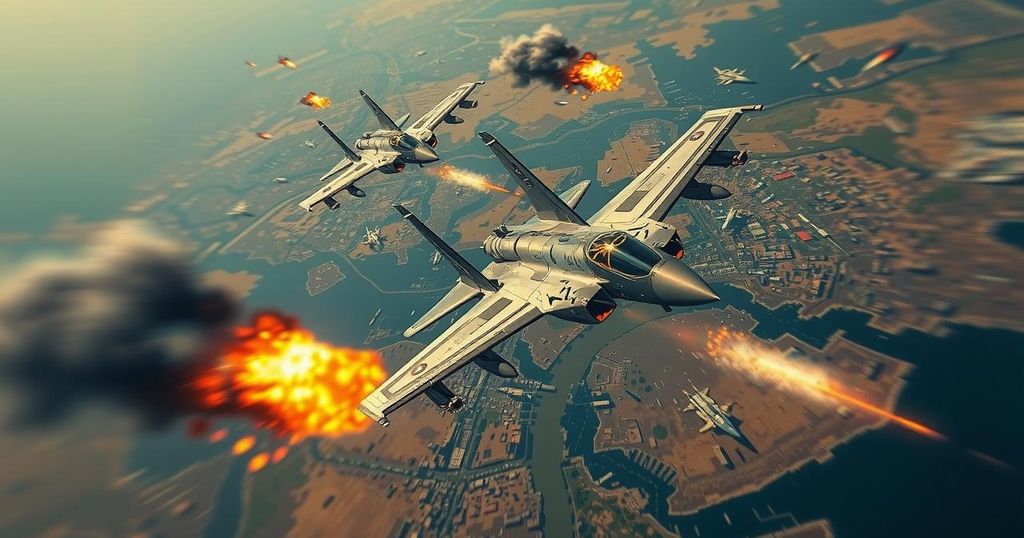Escalating Military Actions in the Middle East: Israel and the US Target Regional Adversaries
Israel has struck Hezbollah targets in Syria, while the U.S. has conducted significant bombings against Houthi positions in Yemen as tensions in the region escalate. The conflict has already led to thousands of deaths across the involved nations, and concerns are rising over civilian casualties amid critiques of military actions by both Israel and the U.S.
On Thursday, Israel conducted a military strike on a Hezbollah target located in Syria, as reported by a war monitoring group. Concurrently, the United States launched heavy bomber airstrikes on Houthi targets in Yemen, one month into the ongoing conflict in Lebanon. The groups involved—Syria, the Houthi rebels in Yemen, Hezbollah in Lebanon, and Hamas in Gaza—are part of a coalition referred to as the “axis of resistance,” which maintains strong ties with Iran. This operation follows Iran’s missile attack on Israel that occurred on October 1. Israel has declared its intent to retaliate against this attack, raising global concerns about the potential escalation of conflict across the region. Iran’s Revolutionary Guards leader notably stated that any Israeli aggression targeting Iranian interests would be met with severe consequences. Reports from Syrian state media indicated that Israeli strikes in the city of Latakia resulted in injuries among civilians, with the Syrian Observatory for Human Rights noting that the Israeli action aimed at a Hezbollah weapon depot. While the Israeli military remained silent on these operations, it has been involved in numerous strikes within Syria over recent years, particularly targeting Hezbollah’s logistics routes from Iran into Lebanon. In Yemen, the U.S. military undertook multiple operations against Houthi-controlled weapon storage sites using B-2 stealth bombers. The Houthis have warned that American military actions will not be overlooked and emphasized their ongoing support for Gaza and Lebanon. Security analyst Mohammed al-Basha remarked that the U.S. bombings indicate a significant shift in Washington’s policy toward a more robust confrontation with the Houthis, who are described as destabilizing forces in the region. The conflict between Israel and Hamas has witnessed significant casualties, with Israeli sources claiming over 1,200 fatalities since Hamas’s attack on October 7. In contrast, health reports from Gaza indicate that the Israeli military campaign has resulted in approximately 42,438 deaths, predominantly among civilians. The situation in Lebanon has similarly deteriorated, with an upsurge in cross-border hostilities involving Hezbollah and Israel. Recent reports confirmed that Israeli airstrikes in southern Lebanon have resulted in numerous civilian casualties, escalating the humanitarian crisis further. Criticism has been directed towards Israel for its military actions in Lebanon from multiple fronts, including the U.S. government. White House officials have expressed concerns that such operations should not jeopardize civilian lives or the integrity of UN peacekeeping efforts in the region. Additionally, the United Nations has raised alarms regarding attacks on healthcare facilities, which have further exacerbated the already dire humanitarian conditions in Lebanon and Gaza. As the war in Gaza progresses, reports indicate that close to 345,000 Palestinians are facing extreme food scarcity, and nearly all of Gaza’s residents are now living in poverty, alongside a staggering unemployment rate nearing 80%. According to the International Labour Organization, the long-term ramifications of this conflict will continue to impact the region for generations to come.
The conflict between Israel and its regional adversaries, including Iran-aligned groups such as Hezbollah and the Houthis, has historically involved a series of skirmishes and military operations. The recent escalation began in October 2023 with a significant attack from Hamas, leading to a sustained Israeli military response and subsequent strikes in Lebanon and Syria. Tensions have risen as both Israel and the United States intensify their military actions against groups associated with Iran in the context of broader geopolitical dynamics and regional alignments.
The recent military actions taken by Israel in Syria and by the United States in Yemen underline the escalating tensions in the region amid ongoing conflicts. As Iran’s involvement fuels a multifaceted war, the resulting humanitarian crises in Gaza and Lebanon are alarming. International responses and criticisms, particularly regarding civilian casualties, highlight the complex nature of warfare in this area, with significant implications for future engagements and regional stability. The toll on both human life and infrastructure is substantial, indicating that the ramifications of this conflict will likely resonate for many years.
Original Source: www.newarab.com




Post Comment